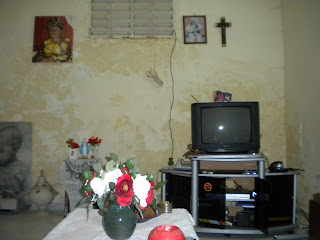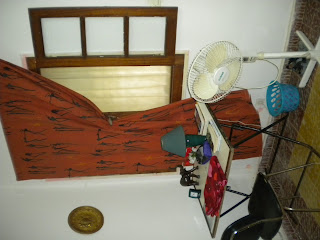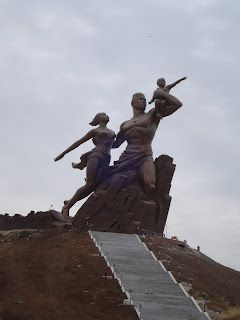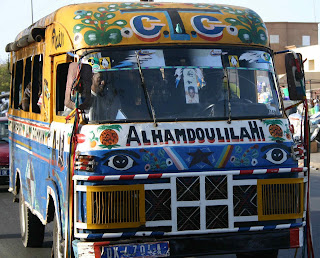
Two issues here - Mendiants (beggars) and animals.
I knew there would be beggars here - more than in the US. But, I wasn't prepared for the swarms of little boys who beg. In Dakar, it is estimated that there are 300,000 beggars. Ths week in school, we watched a documentary about the phenomenon in Dakar that has surfaced in the past couple decades that involves young school-age boys and Islam.
You can't walk down a street here without seeing at least 2-3 boys asking for money or other things. They vary in age from about 5 years-12/13 years. They wear dirty, tattered clothes and carry around old rusty coffee cans to ask for money. They hang around places like bus stops, markets, and fruit/vegetable stands, and mosques (on Fridays) where they know people have money to spend.
THese boys come from rural villages, many in Senegal, but many also from comparatively poorer countries like Mauritania, Guinea-Bissau, Mali, and Nigeria. Their parents send them with "marabous" (Muslim leaders) who promise to teach the boys the Koran and give them a religious education (though not a traditional one). However, this relationship has become abused all over. With Dakar as a Muslim center in West Africa, and rich in comparison with other nearby regions, these young boys have been increasingly used as a business to make money for "marabous." I put marabous in quotation because many of them are frauds - not truly Muslim leaders, but posing as them. This relationship stems from the idea that a Muslim community should support the education of boys in the Koran by going to the marabous and donating to continue this education. However, as cities get larger, the concept of community erodes, and people may be less likely to donate than people living in a close-knit rural community. So, marabous send out these boys to beg in the streets. They come back at night and learn to read the Koran, and not much else.
In interviews with the boys, they said they were expected to make 300-500 francs a day, or else the marabous would beat them at night. Even 5-year olds were expected to make 150 francs. 500 francs is about $1. But, in a country where so many people still make just a few dollars a day, that's a lot to beg for. A long-term consequence of this is that these boys have very limited career trajectories. Their skills are begging, and memorization of the Koran. So, what do they end up doing afterward? They become marabous too (continuing the cycle) or they become street vendors, hustling passersby, selling whatever small items they can.
This issue persists and there are basically two reasons why the Senegalese government has not yet addressed it. One, the Islamic brotherhoods (made up of Imams and marabous) are the most powerful group in politics in Senegal. It would not sit well with them to pass laws that prohibit this practice. Second, Senegal is a developing country and its government simply does not have money to feed, house, clothe, and educate all these thousands of boys.
So, what do you do? Do you give the boys money each time, because you don't want them to get beat at night, even though that contributes to the cycle? It's difficult. I've been giving food, since at least then, they may be a little less controlled by the marabous. It's just a difficult issue. Especially, when they single me and my American friends out, since they know we have money. And, yes, we do. But, what do I do?
Then, there are animals. I went from the United States, which is full of animal shelters and rescues to Senegal, where there aren't even shelters and medical care for people as nice (or existant at all) as what stray domestique animals in the US get. So, what do we do? Do people in developing countries deserve the money that goes to animals in developed countries? Do people merit it more than dogs, cats, and horses? I think most people would say, yes. Yet, nobody really tries to change that in the US or Europe. People don't really speak out against helping animals in developed countries, and there are even organizations that work to help animals instead of people in developing countries. I don't know what the answer is. I mean, it is so sad to see people here who can't afford basic healthcare, so they lose teeth right and left, get gum disease, and die frequently from childbirth. But, it is also sad (for me at least, coming from a country that places high value on taking care of dogs & cats) to see stray dogs shivering in piles of trash, and dying on the streets of parasites. That's another thing that I just don't know how to address. I remember reading a statistic that said that if you took all the money that people in the US and Western Europe (England, Germany, France, and other smaller developed countries) spend on their pets (dogs, cats, small domestic animals), you could supply the entire world with safe drinking water.
I think there are different, but also similar motives for helping people and animals. Helping people makes perfect sense in terms of social stability. It makes sense in terms of empathy for other human beings. It makes sense in terms of equality for everyone like you, since nobody has any choice to enter the world, and is thus a victim of their birth. But, many of those reasons are similar for helping animals, minus (perhaps) social stability. You might argue that animals suffer less than people, but I think that is only in some ways. We all suffer the same in many ways - losing members of our community, fear, and physical pain. Humans suffer more mentally, I think. People being very social creatures, we are subject to more social suffering through less directly physically-induced pain (although often linked to physical suffering). For example, in Senegal the adult literacy rate is 43%. This puts over half of the population at a disadvantage in the job market. They are limited to jobs that do not involve reading or writing. Why is literacy rate so low? School is expensive, and girls often do not attend school as far as boys due to strictly defined gender roles. This limits the entire population, since half of its population (girls) are even less likely to be literate. Why are gender roles so definite here? Part of it is attributable to Muslim culture and part of it attributable to lack of education among the general population, and especially women. Statistics show that the better women are educated, the less children they have, which reduces the economic burden, and increases the likelihood that they'll have more options in terms of daily life choices.
Anyway, I'll stop rambling, because really that's all I'm doing because I haven't reached a conclusion on either of these issues. But, just food for thought....

































